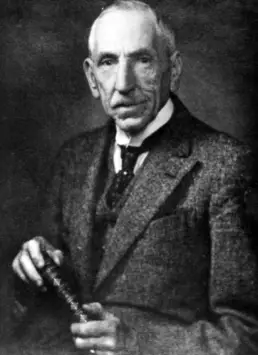These life stories may contain descriptions of childhood trauma and abuse, as well as images, voices and names of people now deceased. If you need help, you can find contact details for some relevant support services on our support page.
7th Prime Minister of Australia, Billy Hughes (1862-1952), was in kinship care as a child.
William Morris Hughes was born in Pimlico, a working class suburb in London to Welsh parents. His father, William, was a carpenter and his mother, Jane, a domestic servant.
When he was six years old, Billy’s mother died and his father sent the child to Wales to live with his paternal aunt. The aunt ran a boarding house in the town of Llandudno and Billy attended the local school.
Here he was taught well in English but also picked up a smattering of colloquial Welsh. Despite his small frame…and chronic dyspepsia…he became a good sportsman as runner and with his fists, and a champion at marbles (Bridge).
At the age of fourteen, Billy began work as a pupil-teacher at St. Stephen’s Grammar School in Pimlico. He’d moved back to London two years previously and taught at the school for five years.
…among the most important skills learned there would have been how to keep the attention of very large classes of potentially unruly pupils (Bridge).
Billy Hughes migrated to Australia in 1884, when it was still six separate colonies. Unable to find work as a teacher in Brisbane, he did a variety of working-class jobs for two years. In 1890, he and his partner, Elizabeth Cutts, moved to Balmain in New South Wales and set up selling second-hand books. Hughes read widely, and trained himself to speak in public.
Hughes began his political career in 1894, when he was commissioned by the Amalgamated Shearers’ Union (later the Australian Workers Union) to travel through outback New South Wales, recruiting members for the union and Labor Electoral League.
He was elected to the seat of Lang and remained in parliament for fifty-eight years.
When Andrew Fisher resigned his position as prime minister in 1915, Billy Hughes was chosen to succeed him. War was the dominant issue, and his support for conscription resulted in him being expelled from his party. However, the new National Labor Party emerged with him as leader and his government was re-elected in 1917 and again in 1919. Hughes served as Prime Minister until 1923, when he resigned and recommended that Stanley Melbourne Bruce be appointed as his replacement.
Billy Hughes is widely acknowledged as an influential if controversial figure. He was honoured with a number of ‘Freedom of the City’ Awards by cities in the UK, and with honorary doctorates from the universities of Birmingham, Edinburgh, Glasgow, Oxford, and Wales.
His state funeral in Sydney was significant, with approximately 450,000 people lining the streets to watch the procession of mourners.
References
“Billy Hughes.” Prime Ministers of Australia. National Museum Australia. https://www.nma.gov.au/explore/features/prime-ministers/billy-hughes
Bridge, Carl. William Hughes: Australia. London: Haus Publishers, 2011.
Fitzhardinge, L.F. “Hughes, William Morris (Billy) (1862-1952).” Australian Dictionary of Biography, vol. 9 (1983). https://adb.anu.edu.au/biography/hughes-william-morris-billy-6761
Image available here.
